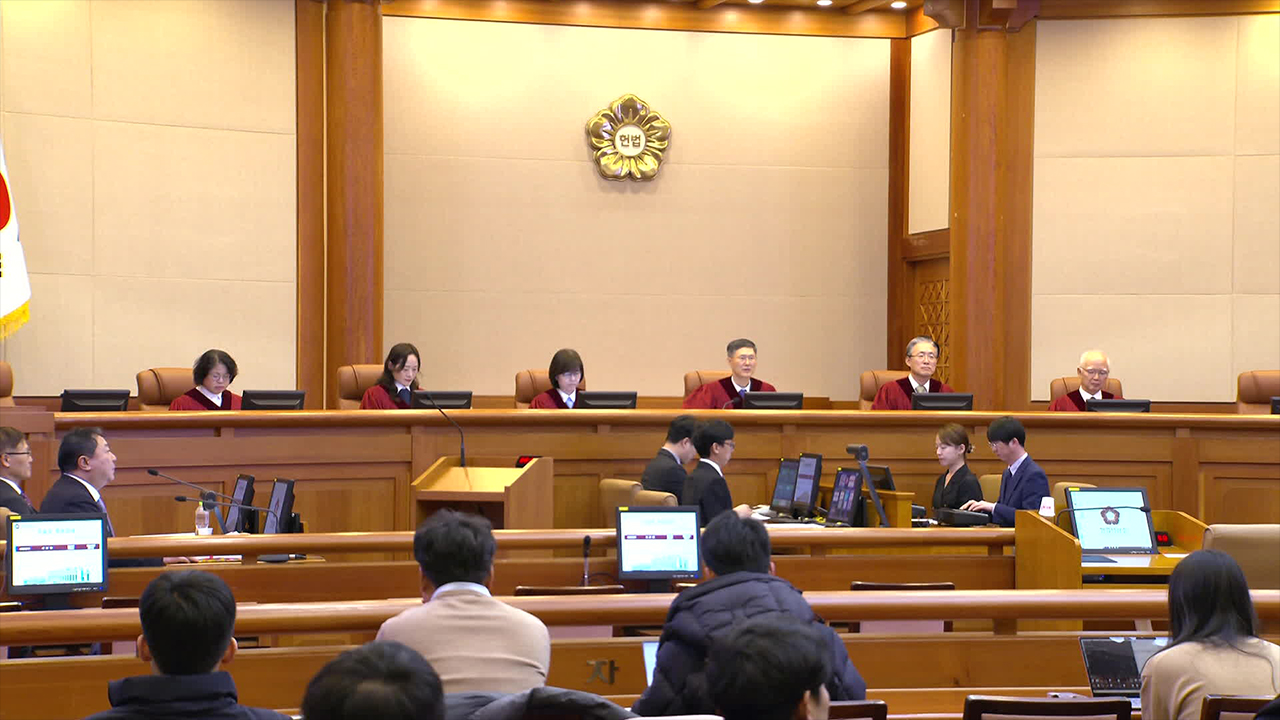Can the 6-judge Constitutional Court handle impeachment hearings?
입력 2024.12.06 (00:01)
읽어주기 기능은 크롬기반의
브라우저에서만 사용하실 수 있습니다.
[Anchor]
If the impeachment motion passes in the National Assembly, the next procedure will be the impeachment trial at the Constitutional Court.
However, the fact that there are currently only six judges instead of the required nine is a concern.
In this situation, whether the impeachment case against the president can be handled is something our reporter Hyun Ye-seul looked into.
[Report]
In October, three judges of the Constitutional Court completed their terms and retired.
As the National Assembly has yet to select their successors, there are currently only six judges instead of the required nine.
According to the Constitutional Court Act, at least seven judges must be present for a case to be heard, but it is possible to proceed with six judges.
This is because a request for a provisional injunction filed by Lee Jin-sook, the chairperson of the Korea Communications Commission, stating that it is unreasonable for the impeachment trial to be halted due to a lack of quorum, was accepted two months ago.
[Moon Hyung-bae/Acting Chief Justice of the Constitutional Court: "Regardless of the specific case, I believe that at least arguing a case is possible based on the decision to suspend the effect of Article 23, Paragraph 1 of the Constitutional Court Act."]
However, for the impeachment to be upheld, all six judges must agree according to the quorum regulations.
If even one judge opposes, it will be dismissed.
Moreover, considering the significance of the issue of 'presidential removal,' it is analyzed that making a decision with only six judges will not be easy.
[Noh Hee-beom/Lawyer/Former Constitutional Court Researcher: "Filling the nine positions is the most ideal and desirable. The purpose is for a collective body to discuss and thoroughly argue various opinions to make a fair and prudent decision."]
The three vacant judges are to be recommended by the National Assembly.
The ruling and opposition parties have previously agreed to complete the recommendation process for the new judges by the 22nd of this month.
However, it is unclear whether the president, who has the final appointment authority for the judges, may delay the appointment of the recommended judges, or if the acting president will exercise the appointment authority in the event of impeachment.
This is KBS News, Hyun Ye-seul.
If the impeachment motion passes in the National Assembly, the next procedure will be the impeachment trial at the Constitutional Court.
However, the fact that there are currently only six judges instead of the required nine is a concern.
In this situation, whether the impeachment case against the president can be handled is something our reporter Hyun Ye-seul looked into.
[Report]
In October, three judges of the Constitutional Court completed their terms and retired.
As the National Assembly has yet to select their successors, there are currently only six judges instead of the required nine.
According to the Constitutional Court Act, at least seven judges must be present for a case to be heard, but it is possible to proceed with six judges.
This is because a request for a provisional injunction filed by Lee Jin-sook, the chairperson of the Korea Communications Commission, stating that it is unreasonable for the impeachment trial to be halted due to a lack of quorum, was accepted two months ago.
[Moon Hyung-bae/Acting Chief Justice of the Constitutional Court: "Regardless of the specific case, I believe that at least arguing a case is possible based on the decision to suspend the effect of Article 23, Paragraph 1 of the Constitutional Court Act."]
However, for the impeachment to be upheld, all six judges must agree according to the quorum regulations.
If even one judge opposes, it will be dismissed.
Moreover, considering the significance of the issue of 'presidential removal,' it is analyzed that making a decision with only six judges will not be easy.
[Noh Hee-beom/Lawyer/Former Constitutional Court Researcher: "Filling the nine positions is the most ideal and desirable. The purpose is for a collective body to discuss and thoroughly argue various opinions to make a fair and prudent decision."]
The three vacant judges are to be recommended by the National Assembly.
The ruling and opposition parties have previously agreed to complete the recommendation process for the new judges by the 22nd of this month.
However, it is unclear whether the president, who has the final appointment authority for the judges, may delay the appointment of the recommended judges, or if the acting president will exercise the appointment authority in the event of impeachment.
This is KBS News, Hyun Ye-seul.
■ 제보하기
▷ 카카오톡 : 'KBS제보' 검색, 채널 추가
▷ 전화 : 02-781-1234, 4444
▷ 이메일 : kbs1234@kbs.co.kr
▷ 유튜브, 네이버, 카카오에서도 KBS뉴스를 구독해주세요!
- Can the 6-judge Constitutional Court handle impeachment hearings?
-
- 입력 2024-12-06 00:01:36

[Anchor]
If the impeachment motion passes in the National Assembly, the next procedure will be the impeachment trial at the Constitutional Court.
However, the fact that there are currently only six judges instead of the required nine is a concern.
In this situation, whether the impeachment case against the president can be handled is something our reporter Hyun Ye-seul looked into.
[Report]
In October, three judges of the Constitutional Court completed their terms and retired.
As the National Assembly has yet to select their successors, there are currently only six judges instead of the required nine.
According to the Constitutional Court Act, at least seven judges must be present for a case to be heard, but it is possible to proceed with six judges.
This is because a request for a provisional injunction filed by Lee Jin-sook, the chairperson of the Korea Communications Commission, stating that it is unreasonable for the impeachment trial to be halted due to a lack of quorum, was accepted two months ago.
[Moon Hyung-bae/Acting Chief Justice of the Constitutional Court: "Regardless of the specific case, I believe that at least arguing a case is possible based on the decision to suspend the effect of Article 23, Paragraph 1 of the Constitutional Court Act."]
However, for the impeachment to be upheld, all six judges must agree according to the quorum regulations.
If even one judge opposes, it will be dismissed.
Moreover, considering the significance of the issue of 'presidential removal,' it is analyzed that making a decision with only six judges will not be easy.
[Noh Hee-beom/Lawyer/Former Constitutional Court Researcher: "Filling the nine positions is the most ideal and desirable. The purpose is for a collective body to discuss and thoroughly argue various opinions to make a fair and prudent decision."]
The three vacant judges are to be recommended by the National Assembly.
The ruling and opposition parties have previously agreed to complete the recommendation process for the new judges by the 22nd of this month.
However, it is unclear whether the president, who has the final appointment authority for the judges, may delay the appointment of the recommended judges, or if the acting president will exercise the appointment authority in the event of impeachment.
This is KBS News, Hyun Ye-seul.
If the impeachment motion passes in the National Assembly, the next procedure will be the impeachment trial at the Constitutional Court.
However, the fact that there are currently only six judges instead of the required nine is a concern.
In this situation, whether the impeachment case against the president can be handled is something our reporter Hyun Ye-seul looked into.
[Report]
In October, three judges of the Constitutional Court completed their terms and retired.
As the National Assembly has yet to select their successors, there are currently only six judges instead of the required nine.
According to the Constitutional Court Act, at least seven judges must be present for a case to be heard, but it is possible to proceed with six judges.
This is because a request for a provisional injunction filed by Lee Jin-sook, the chairperson of the Korea Communications Commission, stating that it is unreasonable for the impeachment trial to be halted due to a lack of quorum, was accepted two months ago.
[Moon Hyung-bae/Acting Chief Justice of the Constitutional Court: "Regardless of the specific case, I believe that at least arguing a case is possible based on the decision to suspend the effect of Article 23, Paragraph 1 of the Constitutional Court Act."]
However, for the impeachment to be upheld, all six judges must agree according to the quorum regulations.
If even one judge opposes, it will be dismissed.
Moreover, considering the significance of the issue of 'presidential removal,' it is analyzed that making a decision with only six judges will not be easy.
[Noh Hee-beom/Lawyer/Former Constitutional Court Researcher: "Filling the nine positions is the most ideal and desirable. The purpose is for a collective body to discuss and thoroughly argue various opinions to make a fair and prudent decision."]
The three vacant judges are to be recommended by the National Assembly.
The ruling and opposition parties have previously agreed to complete the recommendation process for the new judges by the 22nd of this month.
However, it is unclear whether the president, who has the final appointment authority for the judges, may delay the appointment of the recommended judges, or if the acting president will exercise the appointment authority in the event of impeachment.
This is KBS News, Hyun Ye-seul.
-
-

현예슬 기자 yesyes@kbs.co.kr
현예슬 기자의 기사 모음
-
이 기사가 좋으셨다면
-
좋아요
0
-
응원해요
0
-
후속 원해요
0















이 기사에 대한 의견을 남겨주세요.